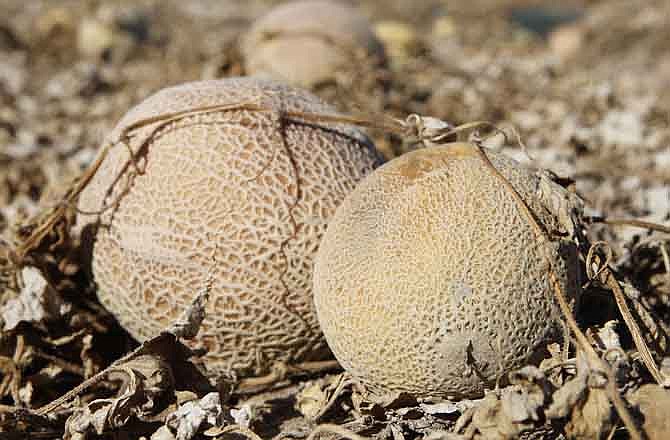WASHINGTON (AP) - Federal health officials said Wednesday more illnesses and possibly more deaths may be linked to an outbreak of listeria in cantaloupe in coming weeks.
So far, the outbreak has caused at least 72 illnesses - including up to 16 deaths - in 18 states, making it the deadliest food outbreak in the United States in more than a decade.
The heads of the Centers for Disease Control and Prevention and the Food and Drug Administration said consumers who have cantaloupes produced by Jensen Farms in Colorado should throw them out. If they are not sure where the fruit is from, they shouldn't eat it.
Neither the government nor Jensen Farms has supplied a list of retailers who may have sold the fruit. Officials say consumers should ask retailers about the origins of their cantaloupe. If they still aren't sure, they should get rid of it.
"If it's not Jensen Farms, it's OK to eat," said Thomas Frieden, director of the CDC. "But if you can't confirm it's not Jensen Farms, then it's best to throw it out."
Jensen Farms, of Holly, Colo., says it shipped cantaloupes to 25 states, though the FDA has said it may be more, and illnesses have been discovered in several states that were not on the shipping list. A spokeswoman for Jensen Farms said the company's product is often sold and resold, so they do not always know where it went.
The recalled cantaloupes may be labeled "Colorado Grown," "Distributed by Frontera Produce," "Jensenfarms.com" or "Sweet Rocky Fords." Not all of the recalled cantaloupes are labeled with a sticker, the FDA said. The company said it shipped out more than 300,000 cases of cantaloupes that contained five to 15 melons, meaning the recall involved 1.5 million to 4.5 million pieces of fruit.
Frieden and FDA Commissioner Margaret Hamburg said illnesses are expected for weeks to come because the incubation period for listeria can be a month or even longer. That means someone who ate contaminated cantaloupe last week may not get sick until next month. Jensen Farms last shipped cantaloupes on Sept. 10. The shelf life is about two weeks.
"We will see more cases likely through October," Hamburg said.
The Food and Drug Administration said state health officials found listeria in cantaloupes taken from Colorado grocery stores and from a victim's home that were grown at Jensen Farms. Matching strains of the disease were found on equipment and cantaloupe samples at Jensen Farms' packing facility in Granada, Colo.
Sherri McGarry, a senior adviser in the FDA's Office of Foods, said the agency is looking at the farm's water supply and possible animal intrusions among other things in trying to figure out how the cantaloupes became contaminated. Listeria bacteria grow in moist, muddy conditions and are often carried by animals.
The health officials said this is the first known outbreak of listeria in cantaloupe. Listeria is generally found in processed meats and unpasteurized milk and cheese, though there have been a growing number of outbreaks in produce. Hamburg called the outbreak a "surprise" and said the agencies are studying it closely to find out how it happened.
Cantaloupe is often the source of outbreaks, however. Frieden said CDC had identified 10 other cantaloupe outbreaks in the last decade, most of them from salmonella.
Listeria is more deadly than well-known pathogens like salmonella and E. coli, though those outbreaks generally cause many more illnesses. Twenty-one people died in an outbreak of listeria poisoning in 1998 traced to contaminated hot dogs and possibly deli meats made by Bil Mar Foods, a subsidiary of Sara Lee Corp. Another large listeria outbreak, in 1985, killed 52 people and was linked to Mexican-style soft cheese.
Listeria generally only sickens the elderly, pregnant women and others with compromised immune systems. The CDC said the median age of those sickened is 78 and that 1 in 5 who contract the disease can die from it. Symptoms include fever and muscle aches, often with other gastrointestinal symptoms.
Unlike many pathogens, listeria bacteria can grow at room temperatures and even refrigerator temperatures. It is hardy and can linger long after the source of the contamination is gone - health officials say people who may have had the contaminated fruit in their kitchens should clean and sanitize any surfaces it may have touched.
The CDC said Tuesday that 13 deaths are linked to the tainted fruit. State and local officials say they are investigating three additional deaths that may be connected.
The death toll released by the CDC Tuesday surpassed the number of deaths linked to an outbreak of salmonella in peanuts almost three years ago. Nine people died in that outbreak. The CDC reported four deaths in New Mexico, two deaths each in Colorado and Texas and one death each in Kansas, Missouri, Nebraska, Oklahoma and Maryland.
New Mexico officials said Tuesday they are investigating a fifth death, while health authorities in Kansas and Wyoming said they too are investigating additional deaths possibly linked to the tainted fruit.
The CDC reported the 72 illnesses and deaths in 18 states. Cases of listeria were reported in California, Colorado, Florida, Illinois, Indiana, Kansas, Maryland, Missouri, Montana, Nebraska, New Mexico, North Dakota, Oklahoma, Texas, Virginia, West Virginia, Wisconsin and Wyoming. The most illnesses were reported in Colorado, which has seen 15 sickened. Fourteen illnesses were reported in Texas, 10 in New Mexico and eight in Oklahoma.
While most healthy adults can consume listeria with no ill effects, it can kill the elderly and those with compromised immune systems. It is also dangerous to pregnant women because it easily passes through to the fetus. The CDC's Frieden said two of those sickened were pregnant women but they have since recovered.

